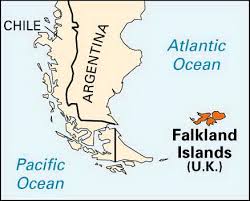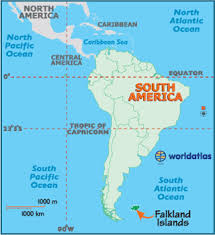 |
| by kids.britannica.com |
Whenever there's a 99.8% yes vote in a referendum, it's a pretty safe bet that something dodgy's going on. And despite David Cameron's insistence that the North Korean-style ballot in the Falkland Islands - or Malvinas as they're known in Argentina - should be treated with "reverence", that rule of thumb clearly fits the bill in this case.
Which is not to suggest that the ballot boxes were stuffed. No doubt 1,514 island residents really did vote in favour of continued British rule. The only surprise was that three islanders dared to spoil the rousing choruses of Land of Hope and Glory by voting against.
It's that the poll was a foregone conclusion and designed to miss the entire point of Britain's dispute with Argentina over the islands - which began 180 years ago when one of Lord Palmerston's gunboats seized them and expelled the Argentine administration.
What other result could conceivably be expected if the future of the islands is put in the hands of the tiny British settler population, most of whom weren't born there but are subsidised to the tune of £44,856 a head to keep them in the Rhodesian retro style to which they are accustomed?
By giving the colonists a veto on any change in the islands' status, the British government is trying to pre-empt the issue at the heart of the conflict. But it won't be recognised by Argentina or Latin America, or Africa, or the UN - which regards this relic of empire as a problem of decolonisation - or the US, which is neutral on the dispute. All call for negotiations on sovereignty, which Britain rejects.
But surely the islanders have the right to self-determination, it's argued, even if they're 300 miles from Argentina and the other side of the world from Britain. They certainly have a right to have their interests and way of life protected, and to self-government.
 |
| by coha.org |
But the right of self-determination depends on who is deciding the future of what territory - and since the dispute is about whether the islands are part of Argentina or not, it's also about who should exercise that right.
Self-determination requires a recognised and viably independent people, which is why the UN has rejected its application to the islands. Clearly the residents of, say, the Wallops in Hampshire, with a similar-sized population to the Falklands-Malvinas, can't exercise such a right. Nor can forced colonisation of other people's lands legitimate self-determination - otherwise Israeli settlers in the occupied West Bank would have the right to decide the future of Palestinian territory.
In fact, British governments only developed a taste for self-determination after they had been forced to abandon the bulk of their empire and saw a way to hold on to colonised enclaves of dependent populations in places like Gibraltar and Northern Ireland.
But it's always been a pick and mix affair: there were no self-determination ballots for the people of Hong Kong or the Chagos Islands, expelled by Britain four decades ago to make way for an American air base in Diego Garcia. There are different rules, it seems, for white people.
Even so, successive British administrations were quite prepared to negotiate with Argentina over the Falklands-Malvinas - including the islands' sovereignty - from the mid-1960s until 1982. But since the Falklands war, its legacy has entrenched an unsustainable £75m-a-year Ruritanian absurdity in the south Atlantic.
The junta's defeat helped free Argentina from a vicious western-backed dictatorship.
But military success was a disaster for Britain, rescuing Margaret Thatcher from the depths of unpopularity to unleash devastating neoliberal shock therapy, and rehabilitating overseas military adventures (complete with little-reported war crimes, such as the killing of Argentinian prisoners).
The Argentinian writer Jorge Luis Borges famously dismissed the war as a "fight between two bald men over a comb". A generation on, the discovery of potentially large oil and gas deposits around the islands, development of fisheries and growing importance of the Antarctic sea lanes have changed the picture.
Received political wisdom has long been that after the 1982 war, in which more than 900 people were killed, no British politician could afford even to hint at compromise on the Falklands. But Argentina's hand is stronger than might appear. To exploit the islands' hydrocarbon deposits on a significant scale would depend on access to the Argentinian mainland - as would serious development of the islands' economy.
Britain's refusal to negotiate with a democratic Argentina - when it was happy to talk to the country's dictators - has no significant international support: least of all in Latin America, which has been booming for a decade, while Britain's and Europe's economies are on their backs.
The options for compromise have been canvassed for many years, including joint sovereignty, co-administration and leaseback. A negotiated settlement is in the interests of Britain, Argentina - and the islanders. The sooner time is called on the emperor's new clothes saga of the Falklands, the better for all of us.
No comments:
Post a Comment